Healthcare Ethics: Analysis of Case Study and Ethical Recommendations
VerifiedAdded on 2020/04/01
|9
|2715
|136
Report
AI Summary
This report provides an in-depth analysis of a healthcare ethics case study, addressing two primary ethical issues: sending a patient home due to lack of improvement and a surgeon working under the influence of alcohol. The analysis delves into the ethical implications of these scenarios, focusing on the concept of human dignity and its importance in nursing practices. The report applies ethical theories such as utilitarianism and virtue ethics to evaluate the actions taken, examining whether they align with ethical principles. Furthermore, it considers professional requirements and healthcare ethics, emphasizing the need for healthcare professionals to uphold ethical codes and professional obligations. The report concludes with recommendations for nursing professionals, stressing the importance of ethical decision-making and adherence to professional standards to ensure patient well-being.
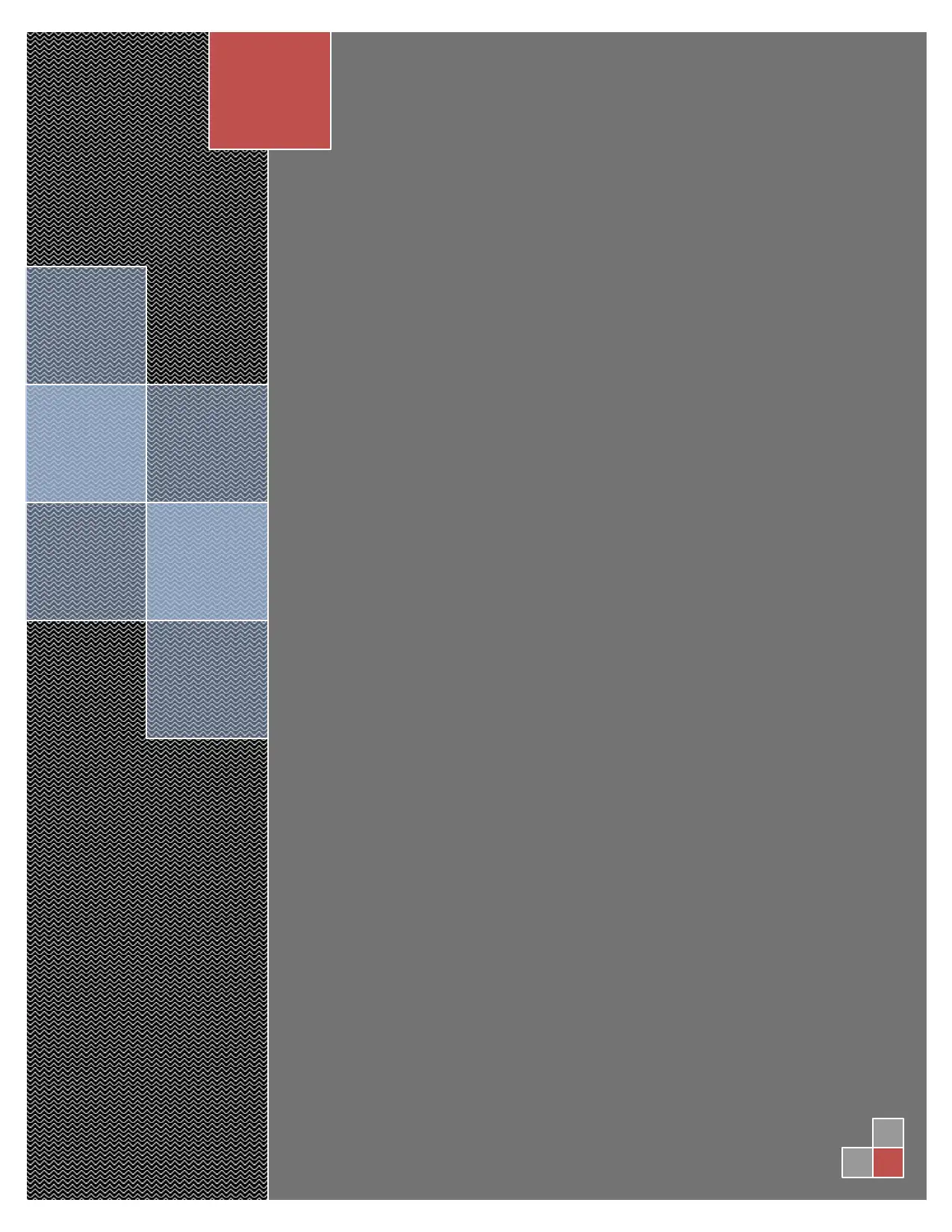
Paraphrase This Document
Need a fresh take? Get an instant paraphrase of this document with our AI Paraphraser
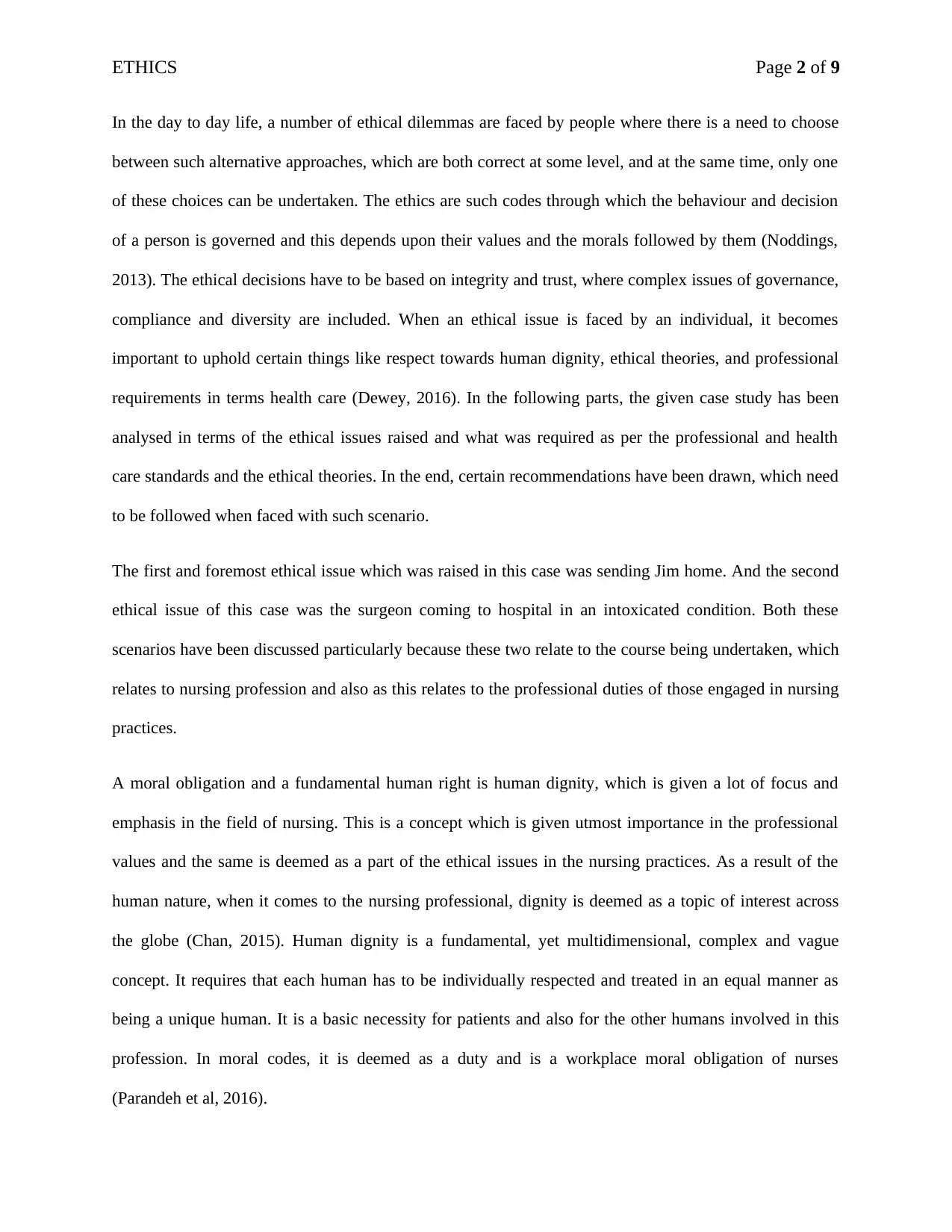
ETHICS Page 2 of 9
In the day to day life, a number of ethical dilemmas are faced by people where there is a need to choose
between such alternative approaches, which are both correct at some level, and at the same time, only one
of these choices can be undertaken. The ethics are such codes through which the behaviour and decision
of a person is governed and this depends upon their values and the morals followed by them (Noddings,
2013). The ethical decisions have to be based on integrity and trust, where complex issues of governance,
compliance and diversity are included. When an ethical issue is faced by an individual, it becomes
important to uphold certain things like respect towards human dignity, ethical theories, and professional
requirements in terms health care (Dewey, 2016). In the following parts, the given case study has been
analysed in terms of the ethical issues raised and what was required as per the professional and health
care standards and the ethical theories. In the end, certain recommendations have been drawn, which need
to be followed when faced with such scenario.
The first and foremost ethical issue which was raised in this case was sending Jim home. And the second
ethical issue of this case was the surgeon coming to hospital in an intoxicated condition. Both these
scenarios have been discussed particularly because these two relate to the course being undertaken, which
relates to nursing profession and also as this relates to the professional duties of those engaged in nursing
practices.
A moral obligation and a fundamental human right is human dignity, which is given a lot of focus and
emphasis in the field of nursing. This is a concept which is given utmost importance in the professional
values and the same is deemed as a part of the ethical issues in the nursing practices. As a result of the
human nature, when it comes to the nursing professional, dignity is deemed as a topic of interest across
the globe (Chan, 2015). Human dignity is a fundamental, yet multidimensional, complex and vague
concept. It requires that each human has to be individually respected and treated in an equal manner as
being a unique human. It is a basic necessity for patients and also for the other humans involved in this
profession. In moral codes, it is deemed as a duty and is a workplace moral obligation of nurses
(Parandeh et al, 2016).
In the day to day life, a number of ethical dilemmas are faced by people where there is a need to choose
between such alternative approaches, which are both correct at some level, and at the same time, only one
of these choices can be undertaken. The ethics are such codes through which the behaviour and decision
of a person is governed and this depends upon their values and the morals followed by them (Noddings,
2013). The ethical decisions have to be based on integrity and trust, where complex issues of governance,
compliance and diversity are included. When an ethical issue is faced by an individual, it becomes
important to uphold certain things like respect towards human dignity, ethical theories, and professional
requirements in terms health care (Dewey, 2016). In the following parts, the given case study has been
analysed in terms of the ethical issues raised and what was required as per the professional and health
care standards and the ethical theories. In the end, certain recommendations have been drawn, which need
to be followed when faced with such scenario.
The first and foremost ethical issue which was raised in this case was sending Jim home. And the second
ethical issue of this case was the surgeon coming to hospital in an intoxicated condition. Both these
scenarios have been discussed particularly because these two relate to the course being undertaken, which
relates to nursing profession and also as this relates to the professional duties of those engaged in nursing
practices.
A moral obligation and a fundamental human right is human dignity, which is given a lot of focus and
emphasis in the field of nursing. This is a concept which is given utmost importance in the professional
values and the same is deemed as a part of the ethical issues in the nursing practices. As a result of the
human nature, when it comes to the nursing professional, dignity is deemed as a topic of interest across
the globe (Chan, 2015). Human dignity is a fundamental, yet multidimensional, complex and vague
concept. It requires that each human has to be individually respected and treated in an equal manner as
being a unique human. It is a basic necessity for patients and also for the other humans involved in this
profession. In moral codes, it is deemed as a duty and is a workplace moral obligation of nurses
(Parandeh et al, 2016).
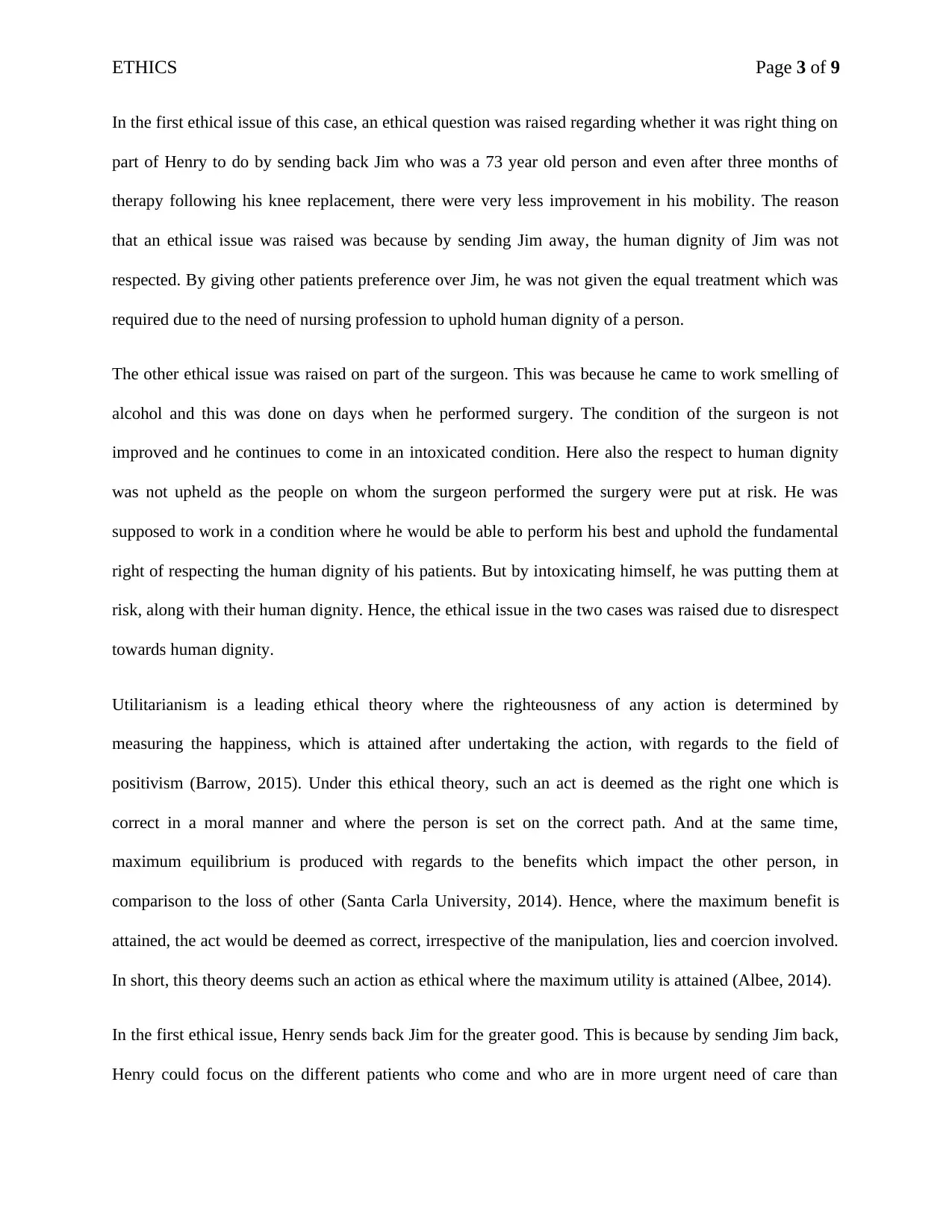
ETHICS Page 3 of 9
In the first ethical issue of this case, an ethical question was raised regarding whether it was right thing on
part of Henry to do by sending back Jim who was a 73 year old person and even after three months of
therapy following his knee replacement, there were very less improvement in his mobility. The reason
that an ethical issue was raised was because by sending Jim away, the human dignity of Jim was not
respected. By giving other patients preference over Jim, he was not given the equal treatment which was
required due to the need of nursing profession to uphold human dignity of a person.
The other ethical issue was raised on part of the surgeon. This was because he came to work smelling of
alcohol and this was done on days when he performed surgery. The condition of the surgeon is not
improved and he continues to come in an intoxicated condition. Here also the respect to human dignity
was not upheld as the people on whom the surgeon performed the surgery were put at risk. He was
supposed to work in a condition where he would be able to perform his best and uphold the fundamental
right of respecting the human dignity of his patients. But by intoxicating himself, he was putting them at
risk, along with their human dignity. Hence, the ethical issue in the two cases was raised due to disrespect
towards human dignity.
Utilitarianism is a leading ethical theory where the righteousness of any action is determined by
measuring the happiness, which is attained after undertaking the action, with regards to the field of
positivism (Barrow, 2015). Under this ethical theory, such an act is deemed as the right one which is
correct in a moral manner and where the person is set on the correct path. And at the same time,
maximum equilibrium is produced with regards to the benefits which impact the other person, in
comparison to the loss of other (Santa Carla University, 2014). Hence, where the maximum benefit is
attained, the act would be deemed as correct, irrespective of the manipulation, lies and coercion involved.
In short, this theory deems such an action as ethical where the maximum utility is attained (Albee, 2014).
In the first ethical issue, Henry sends back Jim for the greater good. This is because by sending Jim back,
Henry could focus on the different patients who come and who are in more urgent need of care than
In the first ethical issue of this case, an ethical question was raised regarding whether it was right thing on
part of Henry to do by sending back Jim who was a 73 year old person and even after three months of
therapy following his knee replacement, there were very less improvement in his mobility. The reason
that an ethical issue was raised was because by sending Jim away, the human dignity of Jim was not
respected. By giving other patients preference over Jim, he was not given the equal treatment which was
required due to the need of nursing profession to uphold human dignity of a person.
The other ethical issue was raised on part of the surgeon. This was because he came to work smelling of
alcohol and this was done on days when he performed surgery. The condition of the surgeon is not
improved and he continues to come in an intoxicated condition. Here also the respect to human dignity
was not upheld as the people on whom the surgeon performed the surgery were put at risk. He was
supposed to work in a condition where he would be able to perform his best and uphold the fundamental
right of respecting the human dignity of his patients. But by intoxicating himself, he was putting them at
risk, along with their human dignity. Hence, the ethical issue in the two cases was raised due to disrespect
towards human dignity.
Utilitarianism is a leading ethical theory where the righteousness of any action is determined by
measuring the happiness, which is attained after undertaking the action, with regards to the field of
positivism (Barrow, 2015). Under this ethical theory, such an act is deemed as the right one which is
correct in a moral manner and where the person is set on the correct path. And at the same time,
maximum equilibrium is produced with regards to the benefits which impact the other person, in
comparison to the loss of other (Santa Carla University, 2014). Hence, where the maximum benefit is
attained, the act would be deemed as correct, irrespective of the manipulation, lies and coercion involved.
In short, this theory deems such an action as ethical where the maximum utility is attained (Albee, 2014).
In the first ethical issue, Henry sends back Jim for the greater good. This is because by sending Jim back,
Henry could focus on the different patients who come and who are in more urgent need of care than
⊘ This is a preview!⊘
Do you want full access?
Subscribe today to unlock all pages.

Trusted by 1+ million students worldwide
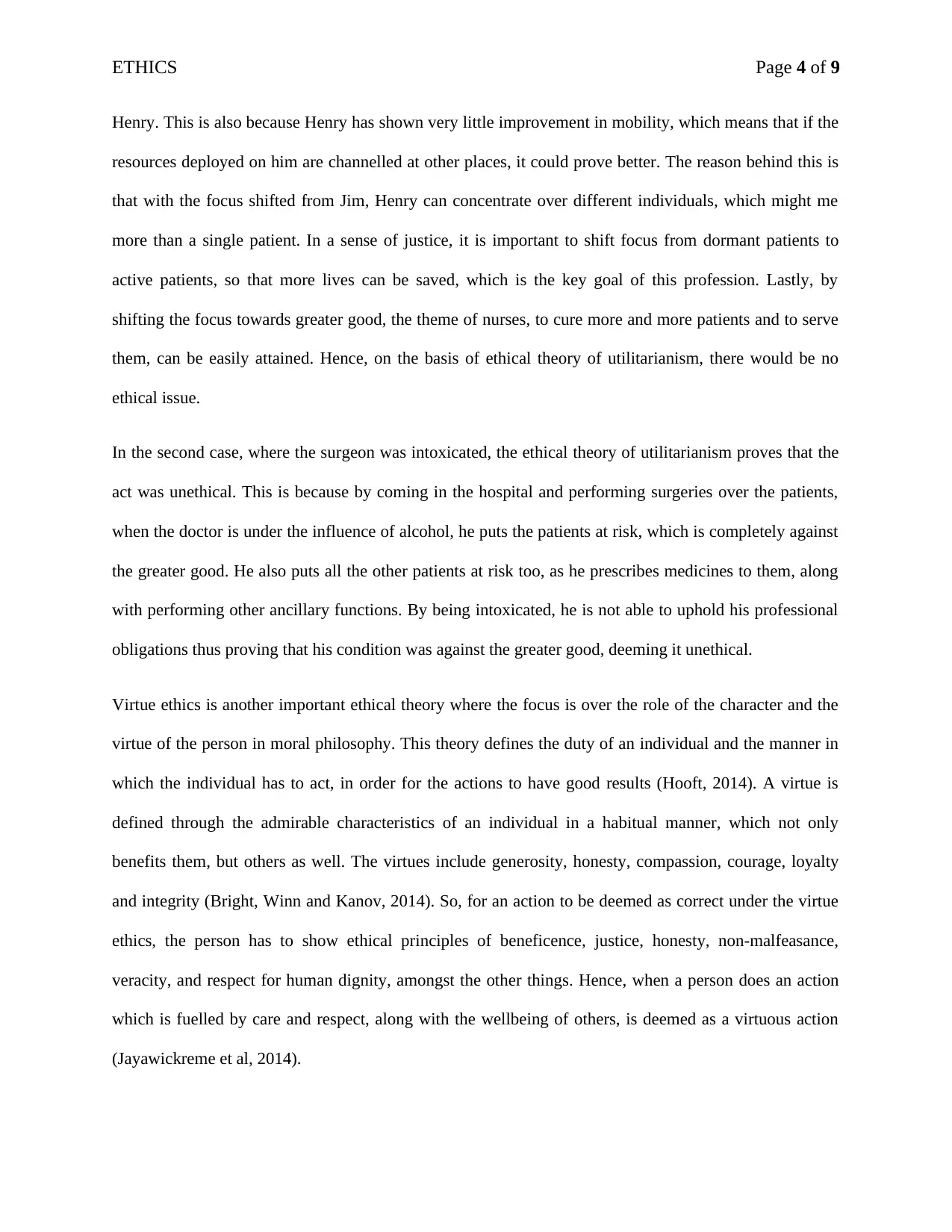
ETHICS Page 4 of 9
Henry. This is also because Henry has shown very little improvement in mobility, which means that if the
resources deployed on him are channelled at other places, it could prove better. The reason behind this is
that with the focus shifted from Jim, Henry can concentrate over different individuals, which might me
more than a single patient. In a sense of justice, it is important to shift focus from dormant patients to
active patients, so that more lives can be saved, which is the key goal of this profession. Lastly, by
shifting the focus towards greater good, the theme of nurses, to cure more and more patients and to serve
them, can be easily attained. Hence, on the basis of ethical theory of utilitarianism, there would be no
ethical issue.
In the second case, where the surgeon was intoxicated, the ethical theory of utilitarianism proves that the
act was unethical. This is because by coming in the hospital and performing surgeries over the patients,
when the doctor is under the influence of alcohol, he puts the patients at risk, which is completely against
the greater good. He also puts all the other patients at risk too, as he prescribes medicines to them, along
with performing other ancillary functions. By being intoxicated, he is not able to uphold his professional
obligations thus proving that his condition was against the greater good, deeming it unethical.
Virtue ethics is another important ethical theory where the focus is over the role of the character and the
virtue of the person in moral philosophy. This theory defines the duty of an individual and the manner in
which the individual has to act, in order for the actions to have good results (Hooft, 2014). A virtue is
defined through the admirable characteristics of an individual in a habitual manner, which not only
benefits them, but others as well. The virtues include generosity, honesty, compassion, courage, loyalty
and integrity (Bright, Winn and Kanov, 2014). So, for an action to be deemed as correct under the virtue
ethics, the person has to show ethical principles of beneficence, justice, honesty, non-malfeasance,
veracity, and respect for human dignity, amongst the other things. Hence, when a person does an action
which is fuelled by care and respect, along with the wellbeing of others, is deemed as a virtuous action
(Jayawickreme et al, 2014).
Henry. This is also because Henry has shown very little improvement in mobility, which means that if the
resources deployed on him are channelled at other places, it could prove better. The reason behind this is
that with the focus shifted from Jim, Henry can concentrate over different individuals, which might me
more than a single patient. In a sense of justice, it is important to shift focus from dormant patients to
active patients, so that more lives can be saved, which is the key goal of this profession. Lastly, by
shifting the focus towards greater good, the theme of nurses, to cure more and more patients and to serve
them, can be easily attained. Hence, on the basis of ethical theory of utilitarianism, there would be no
ethical issue.
In the second case, where the surgeon was intoxicated, the ethical theory of utilitarianism proves that the
act was unethical. This is because by coming in the hospital and performing surgeries over the patients,
when the doctor is under the influence of alcohol, he puts the patients at risk, which is completely against
the greater good. He also puts all the other patients at risk too, as he prescribes medicines to them, along
with performing other ancillary functions. By being intoxicated, he is not able to uphold his professional
obligations thus proving that his condition was against the greater good, deeming it unethical.
Virtue ethics is another important ethical theory where the focus is over the role of the character and the
virtue of the person in moral philosophy. This theory defines the duty of an individual and the manner in
which the individual has to act, in order for the actions to have good results (Hooft, 2014). A virtue is
defined through the admirable characteristics of an individual in a habitual manner, which not only
benefits them, but others as well. The virtues include generosity, honesty, compassion, courage, loyalty
and integrity (Bright, Winn and Kanov, 2014). So, for an action to be deemed as correct under the virtue
ethics, the person has to show ethical principles of beneficence, justice, honesty, non-malfeasance,
veracity, and respect for human dignity, amongst the other things. Hence, when a person does an action
which is fuelled by care and respect, along with the wellbeing of others, is deemed as a virtuous action
(Jayawickreme et al, 2014).
Paraphrase This Document
Need a fresh take? Get an instant paraphrase of this document with our AI Paraphraser
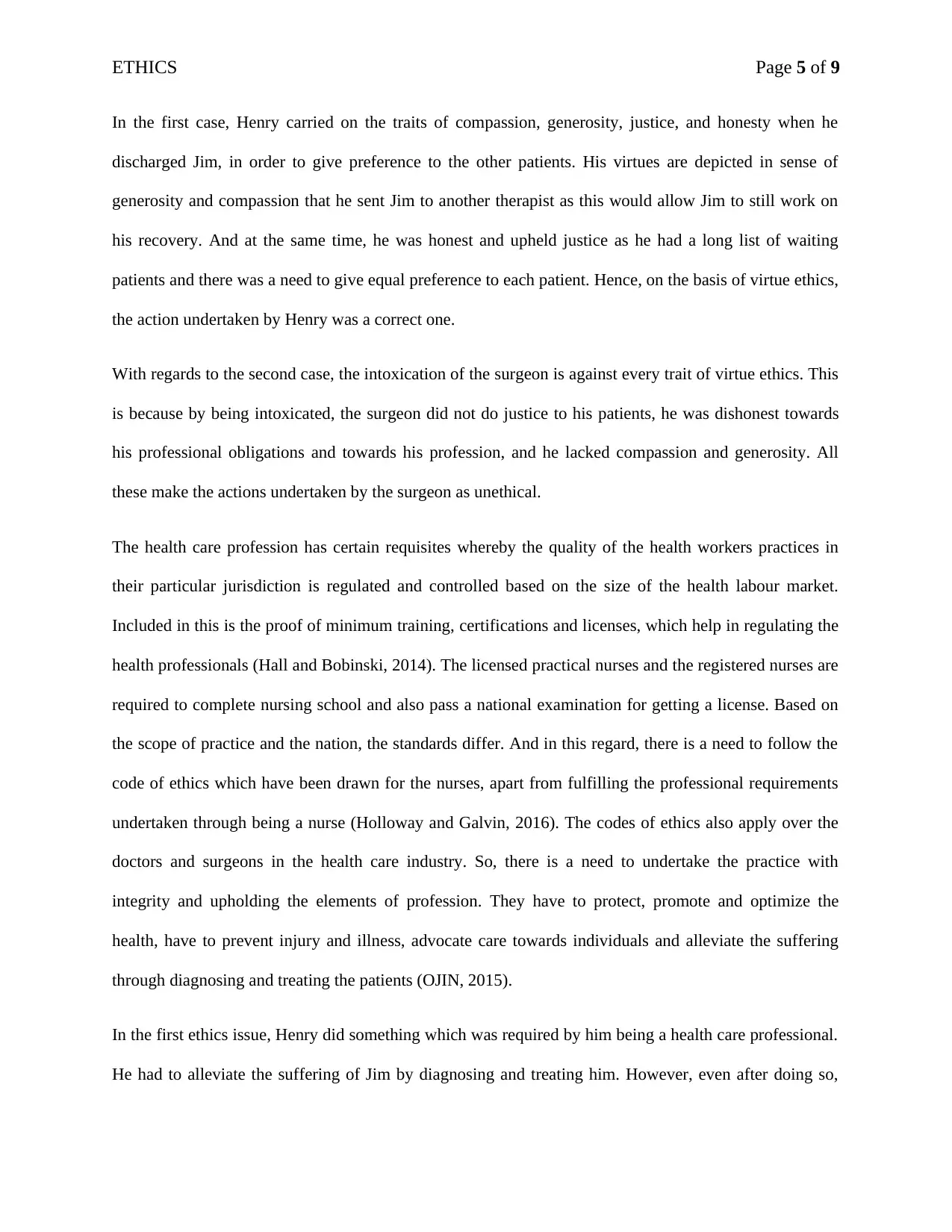
ETHICS Page 5 of 9
In the first case, Henry carried on the traits of compassion, generosity, justice, and honesty when he
discharged Jim, in order to give preference to the other patients. His virtues are depicted in sense of
generosity and compassion that he sent Jim to another therapist as this would allow Jim to still work on
his recovery. And at the same time, he was honest and upheld justice as he had a long list of waiting
patients and there was a need to give equal preference to each patient. Hence, on the basis of virtue ethics,
the action undertaken by Henry was a correct one.
With regards to the second case, the intoxication of the surgeon is against every trait of virtue ethics. This
is because by being intoxicated, the surgeon did not do justice to his patients, he was dishonest towards
his professional obligations and towards his profession, and he lacked compassion and generosity. All
these make the actions undertaken by the surgeon as unethical.
The health care profession has certain requisites whereby the quality of the health workers practices in
their particular jurisdiction is regulated and controlled based on the size of the health labour market.
Included in this is the proof of minimum training, certifications and licenses, which help in regulating the
health professionals (Hall and Bobinski, 2014). The licensed practical nurses and the registered nurses are
required to complete nursing school and also pass a national examination for getting a license. Based on
the scope of practice and the nation, the standards differ. And in this regard, there is a need to follow the
code of ethics which have been drawn for the nurses, apart from fulfilling the professional requirements
undertaken through being a nurse (Holloway and Galvin, 2016). The codes of ethics also apply over the
doctors and surgeons in the health care industry. So, there is a need to undertake the practice with
integrity and upholding the elements of profession. They have to protect, promote and optimize the
health, have to prevent injury and illness, advocate care towards individuals and alleviate the suffering
through diagnosing and treating the patients (OJIN, 2015).
In the first ethics issue, Henry did something which was required by him being a health care professional.
He had to alleviate the suffering of Jim by diagnosing and treating him. However, even after doing so,
In the first case, Henry carried on the traits of compassion, generosity, justice, and honesty when he
discharged Jim, in order to give preference to the other patients. His virtues are depicted in sense of
generosity and compassion that he sent Jim to another therapist as this would allow Jim to still work on
his recovery. And at the same time, he was honest and upheld justice as he had a long list of waiting
patients and there was a need to give equal preference to each patient. Hence, on the basis of virtue ethics,
the action undertaken by Henry was a correct one.
With regards to the second case, the intoxication of the surgeon is against every trait of virtue ethics. This
is because by being intoxicated, the surgeon did not do justice to his patients, he was dishonest towards
his professional obligations and towards his profession, and he lacked compassion and generosity. All
these make the actions undertaken by the surgeon as unethical.
The health care profession has certain requisites whereby the quality of the health workers practices in
their particular jurisdiction is regulated and controlled based on the size of the health labour market.
Included in this is the proof of minimum training, certifications and licenses, which help in regulating the
health professionals (Hall and Bobinski, 2014). The licensed practical nurses and the registered nurses are
required to complete nursing school and also pass a national examination for getting a license. Based on
the scope of practice and the nation, the standards differ. And in this regard, there is a need to follow the
code of ethics which have been drawn for the nurses, apart from fulfilling the professional requirements
undertaken through being a nurse (Holloway and Galvin, 2016). The codes of ethics also apply over the
doctors and surgeons in the health care industry. So, there is a need to undertake the practice with
integrity and upholding the elements of profession. They have to protect, promote and optimize the
health, have to prevent injury and illness, advocate care towards individuals and alleviate the suffering
through diagnosing and treating the patients (OJIN, 2015).
In the first ethics issue, Henry did something which was required by him being a health care professional.
He had to alleviate the suffering of Jim by diagnosing and treating him. However, even after doing so,
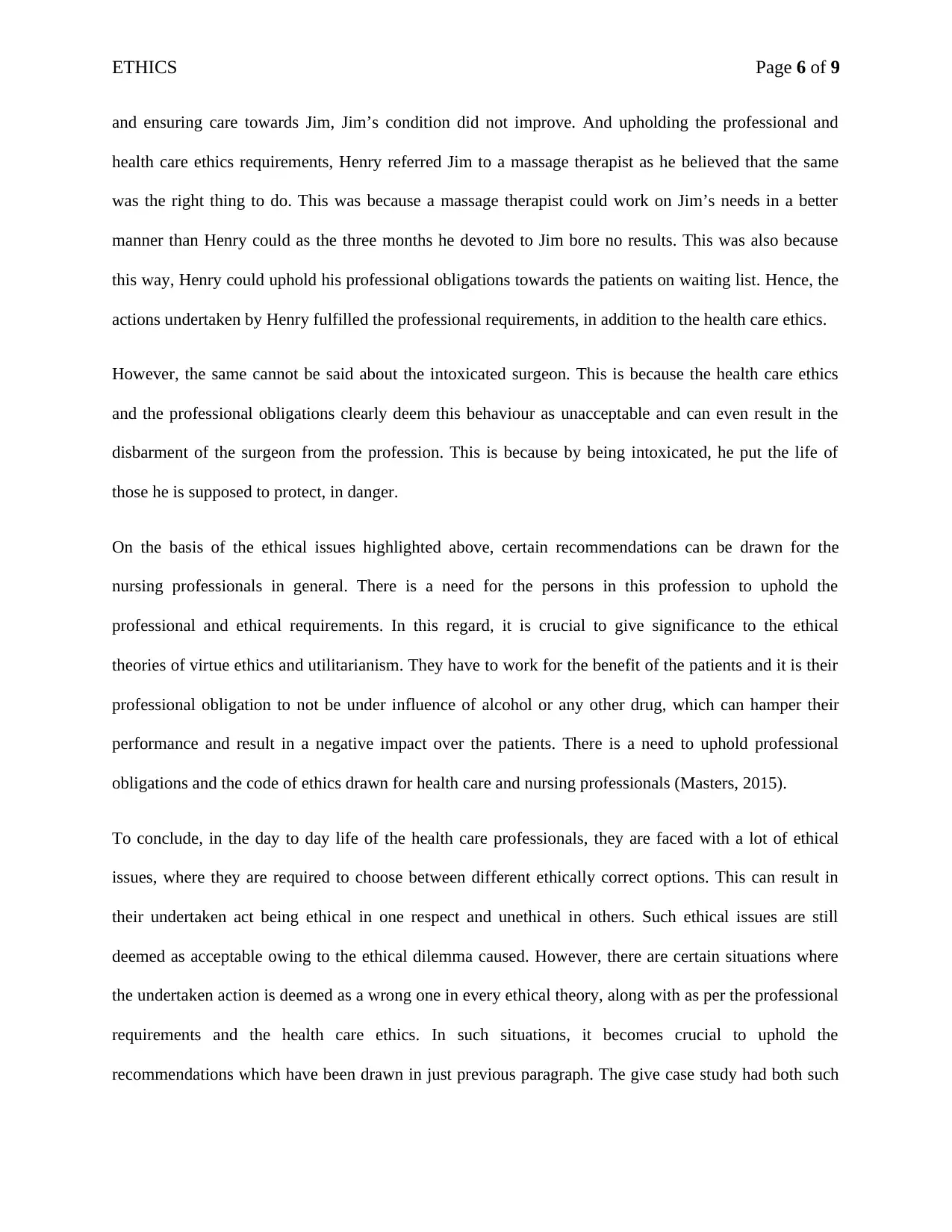
ETHICS Page 6 of 9
and ensuring care towards Jim, Jim’s condition did not improve. And upholding the professional and
health care ethics requirements, Henry referred Jim to a massage therapist as he believed that the same
was the right thing to do. This was because a massage therapist could work on Jim’s needs in a better
manner than Henry could as the three months he devoted to Jim bore no results. This was also because
this way, Henry could uphold his professional obligations towards the patients on waiting list. Hence, the
actions undertaken by Henry fulfilled the professional requirements, in addition to the health care ethics.
However, the same cannot be said about the intoxicated surgeon. This is because the health care ethics
and the professional obligations clearly deem this behaviour as unacceptable and can even result in the
disbarment of the surgeon from the profession. This is because by being intoxicated, he put the life of
those he is supposed to protect, in danger.
On the basis of the ethical issues highlighted above, certain recommendations can be drawn for the
nursing professionals in general. There is a need for the persons in this profession to uphold the
professional and ethical requirements. In this regard, it is crucial to give significance to the ethical
theories of virtue ethics and utilitarianism. They have to work for the benefit of the patients and it is their
professional obligation to not be under influence of alcohol or any other drug, which can hamper their
performance and result in a negative impact over the patients. There is a need to uphold professional
obligations and the code of ethics drawn for health care and nursing professionals (Masters, 2015).
To conclude, in the day to day life of the health care professionals, they are faced with a lot of ethical
issues, where they are required to choose between different ethically correct options. This can result in
their undertaken act being ethical in one respect and unethical in others. Such ethical issues are still
deemed as acceptable owing to the ethical dilemma caused. However, there are certain situations where
the undertaken action is deemed as a wrong one in every ethical theory, along with as per the professional
requirements and the health care ethics. In such situations, it becomes crucial to uphold the
recommendations which have been drawn in just previous paragraph. The give case study had both such
and ensuring care towards Jim, Jim’s condition did not improve. And upholding the professional and
health care ethics requirements, Henry referred Jim to a massage therapist as he believed that the same
was the right thing to do. This was because a massage therapist could work on Jim’s needs in a better
manner than Henry could as the three months he devoted to Jim bore no results. This was also because
this way, Henry could uphold his professional obligations towards the patients on waiting list. Hence, the
actions undertaken by Henry fulfilled the professional requirements, in addition to the health care ethics.
However, the same cannot be said about the intoxicated surgeon. This is because the health care ethics
and the professional obligations clearly deem this behaviour as unacceptable and can even result in the
disbarment of the surgeon from the profession. This is because by being intoxicated, he put the life of
those he is supposed to protect, in danger.
On the basis of the ethical issues highlighted above, certain recommendations can be drawn for the
nursing professionals in general. There is a need for the persons in this profession to uphold the
professional and ethical requirements. In this regard, it is crucial to give significance to the ethical
theories of virtue ethics and utilitarianism. They have to work for the benefit of the patients and it is their
professional obligation to not be under influence of alcohol or any other drug, which can hamper their
performance and result in a negative impact over the patients. There is a need to uphold professional
obligations and the code of ethics drawn for health care and nursing professionals (Masters, 2015).
To conclude, in the day to day life of the health care professionals, they are faced with a lot of ethical
issues, where they are required to choose between different ethically correct options. This can result in
their undertaken act being ethical in one respect and unethical in others. Such ethical issues are still
deemed as acceptable owing to the ethical dilemma caused. However, there are certain situations where
the undertaken action is deemed as a wrong one in every ethical theory, along with as per the professional
requirements and the health care ethics. In such situations, it becomes crucial to uphold the
recommendations which have been drawn in just previous paragraph. The give case study had both such
⊘ This is a preview!⊘
Do you want full access?
Subscribe today to unlock all pages.

Trusted by 1+ million students worldwide
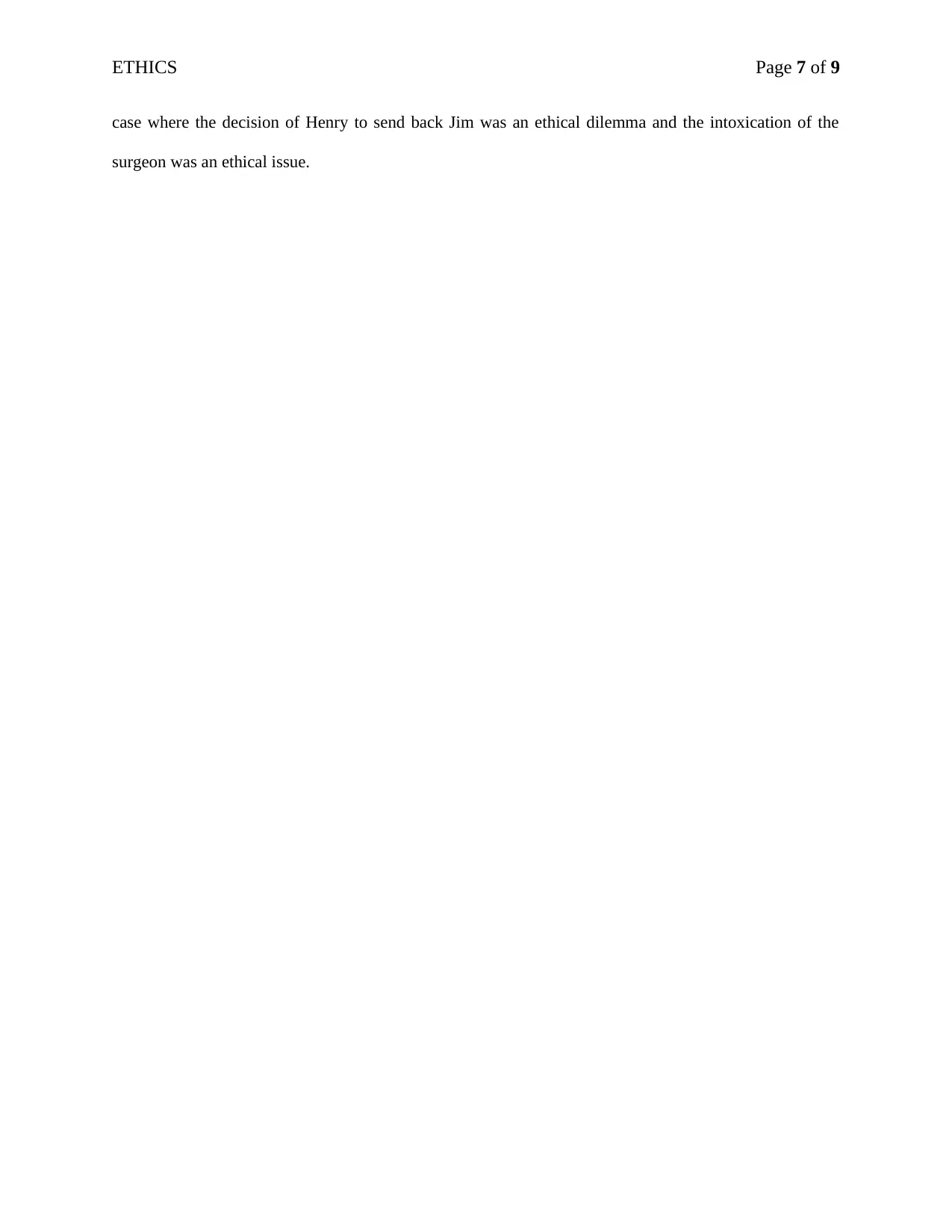
ETHICS Page 7 of 9
case where the decision of Henry to send back Jim was an ethical dilemma and the intoxication of the
surgeon was an ethical issue.
case where the decision of Henry to send back Jim was an ethical dilemma and the intoxication of the
surgeon was an ethical issue.
Paraphrase This Document
Need a fresh take? Get an instant paraphrase of this document with our AI Paraphraser
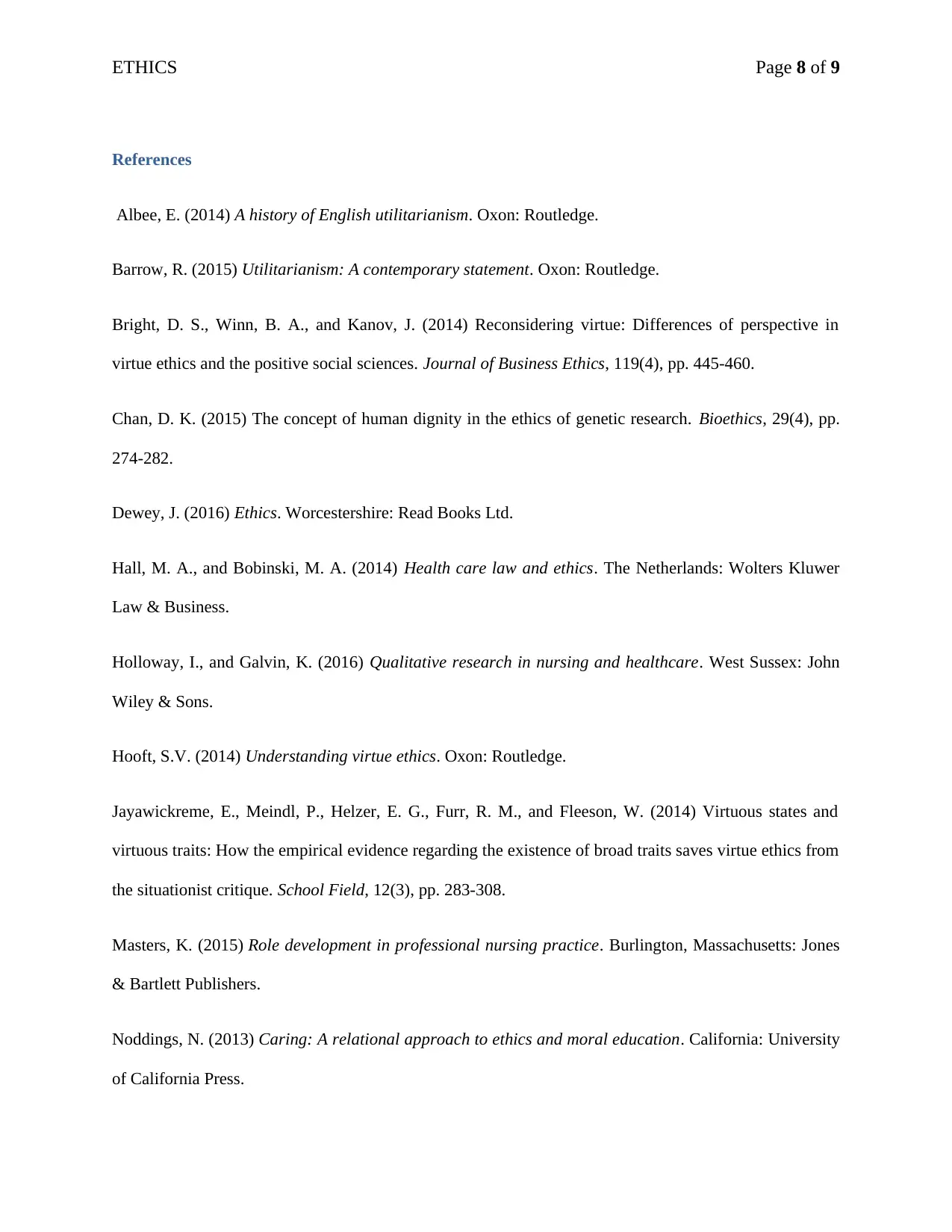
ETHICS Page 8 of 9
References
Albee, E. (2014) A history of English utilitarianism. Oxon: Routledge.
Barrow, R. (2015) Utilitarianism: A contemporary statement. Oxon: Routledge.
Bright, D. S., Winn, B. A., and Kanov, J. (2014) Reconsidering virtue: Differences of perspective in
virtue ethics and the positive social sciences. Journal of Business Ethics, 119(4), pp. 445-460.
Chan, D. K. (2015) The concept of human dignity in the ethics of genetic research. Bioethics, 29(4), pp.
274-282.
Dewey, J. (2016) Ethics. Worcestershire: Read Books Ltd.
Hall, M. A., and Bobinski, M. A. (2014) Health care law and ethics. The Netherlands: Wolters Kluwer
Law & Business.
Holloway, I., and Galvin, K. (2016) Qualitative research in nursing and healthcare. West Sussex: John
Wiley & Sons.
Hooft, S.V. (2014) Understanding virtue ethics. Oxon: Routledge.
Jayawickreme, E., Meindl, P., Helzer, E. G., Furr, R. M., and Fleeson, W. (2014) Virtuous states and
virtuous traits: How the empirical evidence regarding the existence of broad traits saves virtue ethics from
the situationist critique. School Field, 12(3), pp. 283-308.
Masters, K. (2015) Role development in professional nursing practice. Burlington, Massachusetts: Jones
& Bartlett Publishers.
Noddings, N. (2013) Caring: A relational approach to ethics and moral education. California: University
of California Press.
References
Albee, E. (2014) A history of English utilitarianism. Oxon: Routledge.
Barrow, R. (2015) Utilitarianism: A contemporary statement. Oxon: Routledge.
Bright, D. S., Winn, B. A., and Kanov, J. (2014) Reconsidering virtue: Differences of perspective in
virtue ethics and the positive social sciences. Journal of Business Ethics, 119(4), pp. 445-460.
Chan, D. K. (2015) The concept of human dignity in the ethics of genetic research. Bioethics, 29(4), pp.
274-282.
Dewey, J. (2016) Ethics. Worcestershire: Read Books Ltd.
Hall, M. A., and Bobinski, M. A. (2014) Health care law and ethics. The Netherlands: Wolters Kluwer
Law & Business.
Holloway, I., and Galvin, K. (2016) Qualitative research in nursing and healthcare. West Sussex: John
Wiley & Sons.
Hooft, S.V. (2014) Understanding virtue ethics. Oxon: Routledge.
Jayawickreme, E., Meindl, P., Helzer, E. G., Furr, R. M., and Fleeson, W. (2014) Virtuous states and
virtuous traits: How the empirical evidence regarding the existence of broad traits saves virtue ethics from
the situationist critique. School Field, 12(3), pp. 283-308.
Masters, K. (2015) Role development in professional nursing practice. Burlington, Massachusetts: Jones
& Bartlett Publishers.
Noddings, N. (2013) Caring: A relational approach to ethics and moral education. California: University
of California Press.
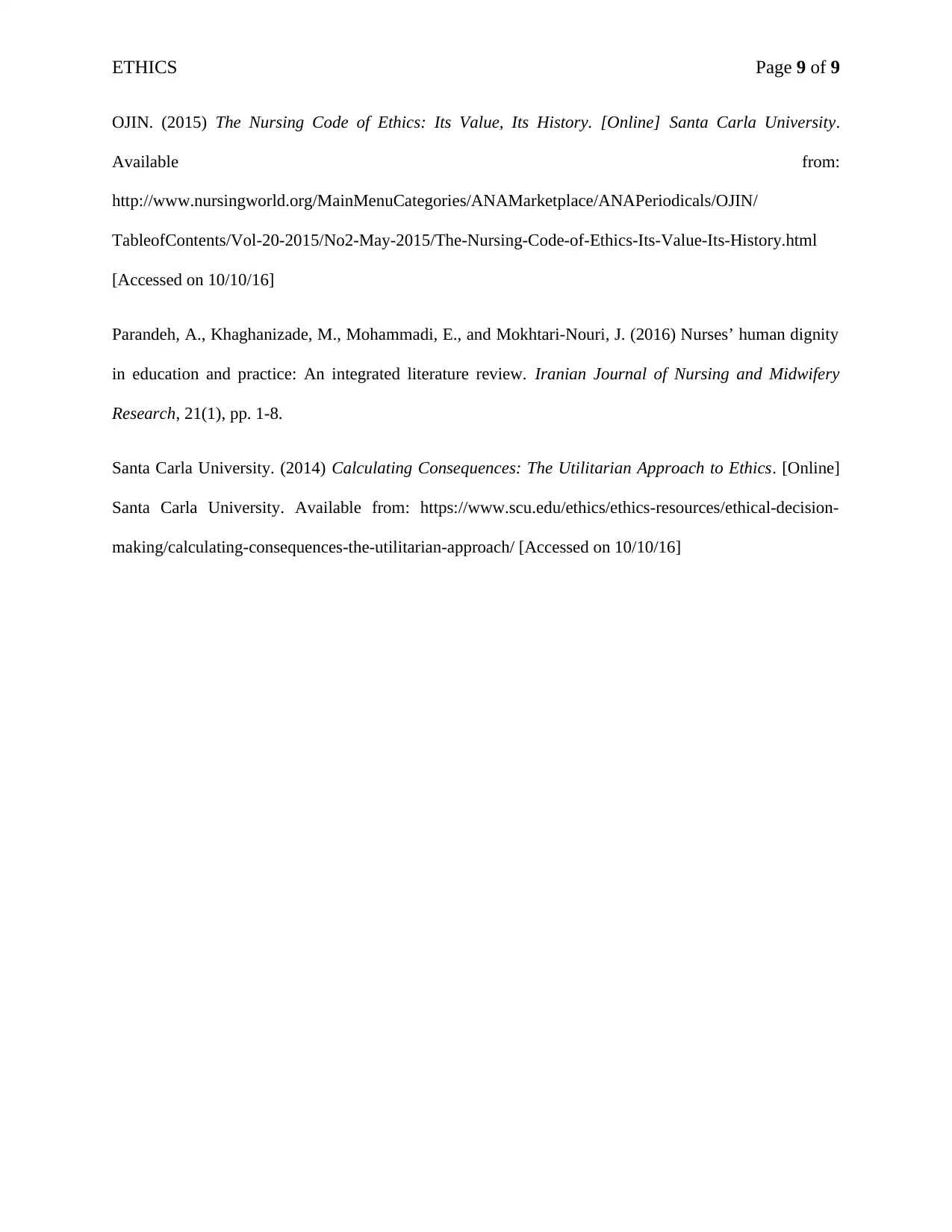
ETHICS Page 9 of 9
OJIN. (2015) The Nursing Code of Ethics: Its Value, Its History. [Online] Santa Carla University.
Available from:
http://www.nursingworld.org/MainMenuCategories/ANAMarketplace/ANAPeriodicals/OJIN/
TableofContents/Vol-20-2015/No2-May-2015/The-Nursing-Code-of-Ethics-Its-Value-Its-History.html
[Accessed on 10/10/16]
Parandeh, A., Khaghanizade, M., Mohammadi, E., and Mokhtari-Nouri, J. (2016) Nurses’ human dignity
in education and practice: An integrated literature review. Iranian Journal of Nursing and Midwifery
Research, 21(1), pp. 1-8.
Santa Carla University. (2014) Calculating Consequences: The Utilitarian Approach to Ethics. [Online]
Santa Carla University. Available from: https://www.scu.edu/ethics/ethics-resources/ethical-decision-
making/calculating-consequences-the-utilitarian-approach/ [Accessed on 10/10/16]
OJIN. (2015) The Nursing Code of Ethics: Its Value, Its History. [Online] Santa Carla University.
Available from:
http://www.nursingworld.org/MainMenuCategories/ANAMarketplace/ANAPeriodicals/OJIN/
TableofContents/Vol-20-2015/No2-May-2015/The-Nursing-Code-of-Ethics-Its-Value-Its-History.html
[Accessed on 10/10/16]
Parandeh, A., Khaghanizade, M., Mohammadi, E., and Mokhtari-Nouri, J. (2016) Nurses’ human dignity
in education and practice: An integrated literature review. Iranian Journal of Nursing and Midwifery
Research, 21(1), pp. 1-8.
Santa Carla University. (2014) Calculating Consequences: The Utilitarian Approach to Ethics. [Online]
Santa Carla University. Available from: https://www.scu.edu/ethics/ethics-resources/ethical-decision-
making/calculating-consequences-the-utilitarian-approach/ [Accessed on 10/10/16]
⊘ This is a preview!⊘
Do you want full access?
Subscribe today to unlock all pages.

Trusted by 1+ million students worldwide
1 out of 9
Related Documents
Your All-in-One AI-Powered Toolkit for Academic Success.
+13062052269
info@desklib.com
Available 24*7 on WhatsApp / Email
![[object Object]](/_next/static/media/star-bottom.7253800d.svg)
Unlock your academic potential
Copyright © 2020–2026 A2Z Services. All Rights Reserved. Developed and managed by ZUCOL.




